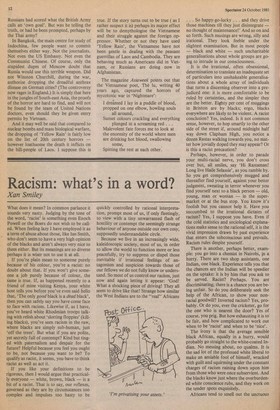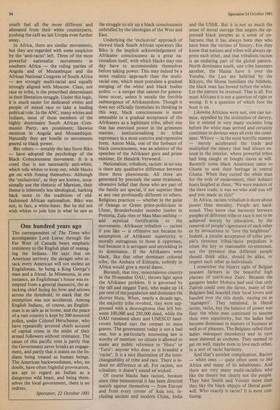Racism: what's in a word?
Xan Smiley
What does it mean? In common parlance it sounds very nasty. Judging by the tone of the word, 'racist' is something even Enoch Powell or the Boers do not wish to be called. When feeling lazy I have employed it as a term of abuse about those, like Ian Smith, who don't seem to have a very high opinion of the blacks and aren't always very nice to them either. But its meanings are so diverse perhaps it is wiser not to use it at all.
If you're plain mean to someone purely because of his colour, you're a racist: no doubt about that. If you won't give someone a job purely because of colour, the same is true. If, as happened recently to a friend of mine visiting Kenya, your white host tells you before you've even said hello that, 'The only good black is a dead black', then you can safely say you have come face to face with racism. Likewise if, as I have, you've heard white Rhodesian troops talking with relish about 'slotting floppies' (killing blacks), you've seen racism in the raw, where blacks are simply sub-human, just 'off the trees'. But what if you are polite, yet secretly full of contempt? Kind but tinged with paternalism and despair for the future? Helpful because you feel you ought to be, not because you want to be? To qualify as racist, it seems, you have to think racist as well as act it.
If you like your definitions to be rigorous, then I would argue that practically everyone — white, brown, black — is a bit of a racist. That is to say, our reflexes, governed as they are by circumstances too complex and impulses too hasty to be quickly controlled by rational interpretation, prompt most of us, if only fleetingly, to view with a tiny unwarranted flash of hostility or contempt the seemingly strange behaviour of anyone outside our own cosy, supposedly understandable circle.
Because we live in an increasingly wide, kaleidoscopic society, most of us, in order to allow the world to function more or less peacefully, try to suppress or dispel those inevitable if irrational feelings of antagonism and suspicion towards those of our fellows we do not fully know or understand. So most of us control our racism, just now and again letting it appear: 'God! What a shocking piece of driving! They all seem to drive like that! Strange how similar the West Indians are to the "real" Africans . . . So happy-go-lucky. . . and they drive those machines till they just disintegrate — no thought of maintenance!' And so on and so forth. Such musings are wrong, silly and irational. They look feeble under the slightest examination. But in most people — black and white — such uncharitable generalisations about whole groups are going to intrude in our consciousness.
It is the irrational, often obsessional, determination to translate an inadequate set of particulars into unshakeable generalisations about a whole array of individuals that turns a discerning observer into a prejudiced one: it is more comfortable to be ruled by certainties, and the simpler they are the better. Eighty per cent of muggings in Brixton are by blacks; ergo, blacks everywhere are likely to be violent. A racist conclusion? Yes, indeed. Is it not common sense, however, to hop smartly to the other side of the street if, around midnight half way down Clapham High, you notice a dozen Rastas walking towards you, no matter how jovially doped they may appear? Or is this a racist precaution?
Perhaps, however, in order to parade your multi-racial nerve, you don't cross over but, all smiles, say 'Hi Rastaman! Long live Haile Selassie', as you ramble by. So you get comprehensively mugged and thereafter find yourself, against your better judgment, sweating in terror whenever you find yourself next to a black person — old, young, man or woman — in the supermarket or at the bus stop. You know it's foolish but you cannot help it. Have you succumbed to the irrational dictates of racism? Yes, I suppose you have. Even if the cold statistics and sociological explanations make sense to the rational self, it is the vivid impression drawn by past experience that enters the subconscious and prevails. Racism rules despite yourself.
There is another, perhaps better, example: you go into a chemist in Nairobi, in a hurry. There are two shop assistants, one Indian, one black. Experience tells you that the chances are the Indian will be speedier on the uptake: it is by him that you ask to be served. Racist? Perhaps. You are discriminating; there is a chance you are being unfair. So do you deliberately seek the help of the African, to show your nonracial goodwill? Inverted racism? Yes, probably. Or do you, ever the cricketer, go for the one who is nearest the door? Yes of course, you prig. But how exhausting it is to be fair, and how complicated to work out when to be 'racist' and when to be 'nice'.
The irony is that the average sensible black African, equally in a hurry, would probably go straight to the white-coated Indian. No messing about, no qualms. It is the sad lot of the professed white liberal to make an amiable fool of himself, wracked with guilt and squirming under the constant charges of racism raining down upon him from those who were once subservient. And the blacks know just where the overburdened white conscience rubs, and they work on the tender spots exquisitely.
Africans tend to smell out the unctuous liberal a mile away. (Yes, all unsubstantiated generalisations can be considered racist. And by the same token it is arguably just as racist to say 'Africans are great musicians' as it is to say 'Africans will never cope with spatial thinking'.) But what is more insidious is that the guilty liberal sycophant, bending over blackwards, as they say in the South, is actually adding racist insult to injury by applying a special conpensatory yardstick: by ludicrously overpraising mediocre black leaders — like the articulate humbug Nyerere or the amiable buffoon Kaunda — for their paltry accomplishments, he is saying to Africa: we will not judge you by the standards we apply to our own leaders.
For most blacks — in Africa, at any rate — are not afraid to accept that there are profound differences that separate white from black. They are indeed often far less neurotic about them than the eager white liberal who, by relentlessly confusing equality with sameness, tries to squeeze his black friends into ideological and cultural straitjackets made in Europe and which do not usually fit in Africa. Black and white are equal, runs the humanitarian theory, therefore we must make them (or rather — preferably — the blacks) the same.
That is the great fallacy that runs through egalitarian thinking, and particularly confuses the issue of racial justice. The blacks cleverly used white liberal arguments to release themselves from their shackles. Now, once the white masters have gone, the assumption is that the blacks want to rule and live like the white men before them. This is quite untrue. The blacks were tolerant of the few whites who stayed on, but hardly wished to imitate them.
Even in the USA, the desire of blacks to meet the accepted norms of liberal whites who helped the fight against racism is open to question. The blacks wanted equality, of course. But not, it seems, in order to live together with whites — rather, to live apart, segregated, but as a potent national interest group in American society and politics, not as an integral part of it.
This refusal to identify equality with sameness sustains further charges or racism against those — black as well as white — who do not play the integrationist game: 'You do not treat them the same as your own kind,' the argument runs, 'therefore you're a racist.' The Western diplomat rarely invites an African politician to a sitdown dinner party because the chances of him coming are less than evens. Modern Africa still holds that timetables are not to be rigidly adhered to. Buffets are the order of the official evening. So the diplomat treats his white and black guests differently. Is he a racist? Or is he merely catering for different customs?
The depth of differences between the races — whether the result of heredity or environment or, as I believe obvious, of both, but in unquantifiable proportions — has been denied with such vehemence in the USA that when the liberal has been con fronted by some sequence of experience that suggests a deeper irreconcilability between black and white, the whole edifice of integrationist, egalitarian conviction begins to tremble.
Of late this seems to be happening. No one in New York seems to want to talk about black rights any more. No one seems obliged to have even a token black at the dinner table. 'We did our bit for the blacks ten years ago, and they don't seem to be grateful': that appears to be the mumbled grouse nowadays. Feminism and the nuclear debate are more popular. Racism is almost fashionable again. Washington DC is almost as segregated as Soweto, and within a decade I guarantee that some suburbs of Johannesburg will be more multi-racial.
One of the more significant aspects in the whole sphere of race is the question whether blacks should fight alone for their rights, thereby laying themselves open to charges of racism, sometimes gratuitously called 'racism in reverse' under the absurd misconception that racism is by definition perpetrated by whites and that 'black racism' might not count as such.
On this question the anti-racist industry is muddled. In England, many leftwingers, while praising the idea of a multi-racial 'colour-blind' society, encourage young blacks to form their own militant groups, to study Ras Tafari, Shaka Zulu, Bob Marley et al in order to build up black pride. Yet that, of course, may tend to make black youth feel all the more different and alienated from their white counterparts, pushing the cafe au lait Utopia even further away.
In Africa, there are similar movements, but they are regarded with some suspicion by the 'anti-racist' left. Three of the most powerful nationalist movements in southern Africa — the ruling parties of Angola and of Mozambique and the African National Congress of South Africa — are strongly multi-racial and equally strongly aligned with Moscow. Class, not race or tribe, is the prescribed determinant in their liberation struggle. Under this logic, it is much easier for dedicated whites and people of mixed race to take a leading political role. In the ANC, many whites and Indians, most of them members of the highly doctrinaire South African Communist Party, are prominent; likewise mesticos in Angola and Mozambique. Naturally they are hostile to movements geared to black power.
But others — notably the late Steve Biko — have adopted the psychology of the Black Consciousness movement. It is a creed that is not necessarily anti-white, which tells whites to keep out, while blacks get on with freeing themselves. Although the `exclusivists', as they are known, occasionally use the rhetoric of Marxism, their theme is inherently less ideological, harking back more to the traditions of oldfashioned African nationalism. Biko was not, in fact, a white-hater. But he did not wish whites to join him in what he saw as the struggle to stir up a black consciousness unbridled by the ideologies of the West and East.
Underlying the `exclusivise approach of shrewd black South African operators like Biko is the implicit acknowledgement of Afrikaner consciousness as a great nationalism itself, with which blacks may one day have to accommodate themselves before taking power. This may indeed be a more realistic approach than the multiracial one, which must postulate a gradual merging of the white and black bodies politic — a merger that cannot for generations occur, unless it entails the forcible submergence of Afrikanerdom. Though it does not officially formulate its thinking in this way, black consciousness is more amenable to a gradual acceptance of the Afrikaners as a legitimate tribe, albeit one that has exercised power in the grimmest manner, institutionalising its tribal supremacy in a most coercive and repressive form. Anton Mda, one of the forbears of black consciousness, was an admirer of the speeches of the Afrikaner guru and prime minister, Dr Hendrik Verwoerd.
Nationalism, tribalism, racism: in no way is there any qualitative difference between these three phenomena. All three are generated by precisely the same irrational, obsessive belief that those who are part of the family are special, if not superior then at any rate profoundly different to others. Religious practices — whether in the guise of Orange or Green priest-politicians in Ulster, Broederbonder mumbo jumbo in Pretoria, Zulu rites or Mau Mau oathing — add mystical fortification to the movements. Afrikaner tribalism — racism if you like — is offensive not because its assumption of Afrikaner superiority is morally outrageous to those it oppresses, but because it is arrogant and unyielding in its dominance. If the Afrikaners were black, like that other dominant colonial tribe, the Amhara of Ethiopia, nobody in Africa would give a moral damn.
Burundi, that tiny, mountainous country in the 50-member OAU, throws light upon the Afrikaner problem. It is governed by the tall and elegant Tutsi, who make up 14 per cent of the population and dominate the shorter Hutu. When, nearly a decade ago, the majority tribe revolted, they were suppressed with a thoroughness that left between 100,000 and 250,000 dead, while the OAU remained silent and UNESCO landrovers helped cart the corpses to mass graves. The government today is not a bad one, but a particularly interesting law is worthy of mention: no citizen is allowed to make any public reference to 'Hutu' or 'Tutsi': anyone who does so is branded a 'racist'. It is a nice illustration of the interchangeability of tribe and race. There is indeed no difference at all. For racism, use tribalism: it doesn't sound so wicked.
Of course blacks hate racism, because since time immemorial it has been directed mainly against themselves — from Europe and from every corner of Asia too, including ancient and modern China, India and the USSR. But it is not so much the sense of moral outrage that angers the oppressed black peoples as a sense of unfairness that it has always been they who have been the victims of history. For they know that nations and tribes will always oppress each other, and that tribalism/racism is an enduring part of the global pattern. North dominates south, one tribe hammers another, the Hausa have it over the Yoruba, the Luo are belittled by the Kikuyu, the Shona humiliate the Ndebele, the black man has bowed before the white. Let the pattern be reversed. That is all. For most Africans it is not a question of right or wrong. It is a question of which foot the boot is on.
Likewise Africans were not, one can surmise, appalled by the institution of slavery, for it existed in very many societies long before the white man arrived and certainly continues in devious ways all over the continent. Whitey — in the most horrific manner — merely accelerated the trade and multiplied the misery that had always existed in the interior, where powerful tribes had long caught or bought slaves at will. Recently some black Americans came to Ghana to seek their heritage in central Ghana. When they cursed the white man for the evils of enslavement, their Ashanti hosts laughed at them. 'We were masters of the slave trade, it was we who sold you off and you made us rich!'
In Africa, racism/tribalism is more about power than morality. People are hardnosed. They know that harmony between peoples of different tribe or race is not to be achieved merely by education, by the removal of people's ignorance of each other or by invocations to 'love thy neighbour'. Indeed, a jocular acceptance of other people's tiresome tribal/racist prejudices is often the key to reasonable co-existence, not the pretence that different people should think alike, should be alike, or respect each other as individuals.
I remember the bizarre sight of Belgian peasant farmers in the beautiful high plateau of north-east Zaire. Because the gangster leader Mobutu had said that only Zairois could own the farms, many of the Belgians had married their local lovers and handed over the title deeds, staying on as 'managers'. They remained, in liberal terms, racist, but the balance of power was fine: the white men continued to assume their own superiority, but the ladies had become dominant in matters of business as well as of pleasure. The Belgians called their ladies macaques (monkeys) and in turn were damned as cochons. They seemed to get on well, maybe even to love each other, in a sort of racist harmony.
And that's another complication. Racists — white ones -quite often seem to like Africa and many of its inhabitants. And there are very many multi-racialists who like the theory but clearly not the people. They hate Smith and Vorster more than they like the black objects of liberal goodwill. Who exactly is racist? It is most confusing.




































 Previous page
Previous page